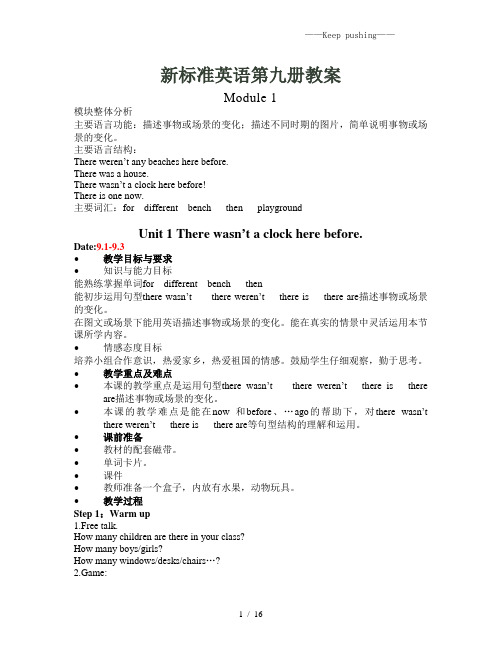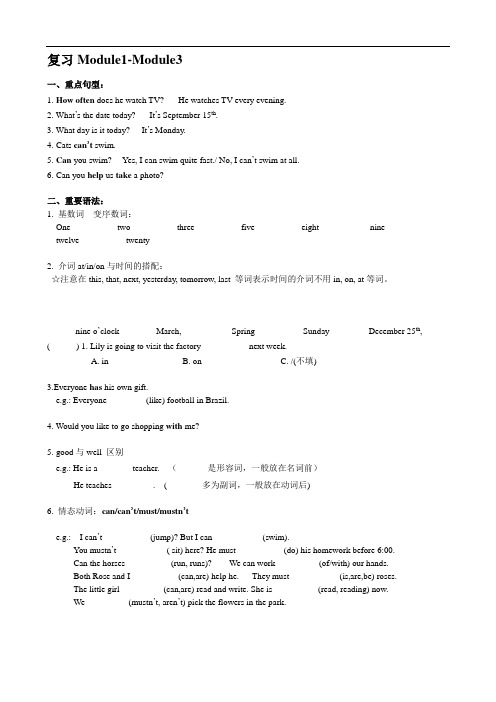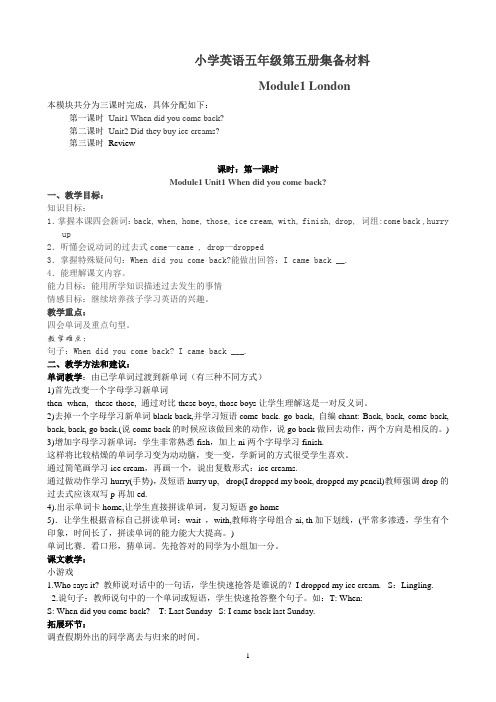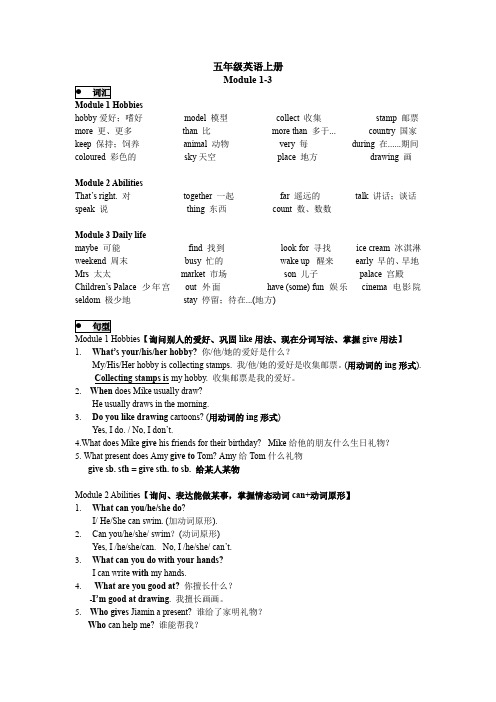广州英语暑假补习小学五年级上M1-M3一到三模块
- 格式:doc
- 大小:162.50 KB
- 文档页数:8

新标准英语第九册教案Module 1模块整体分析主要语言功能:描述事物或场景的变化;描述不同时期的图片,简单说明事物或场景的变化。
主要语言结构:There weren’t any beaches here before.There was a house.There wasn’t a clock here before!There is one now.主要词汇:for different bench then playgroundUnit 1 There wasn’t a clock here before.Date:9.1-9.3•教学目标与要求•知识与能力目标能熟练掌握单词for different bench then能初步运用句型there wasn’t there weren’t there is there are描述事物或场景的变化。
在图文或场景下能用英语描述事物或场景的变化。
能在真实的情景中灵活运用本节课所学内容。
•情感态度目标培养小组合作意识,热爱家乡,热爱祖国的情感。
鼓励学生仔细观察,勤于思考。
•教学重点及难点•本课的教学重点是运用句型there wasn’t there weren’t there is there are描述事物或场景的变化。
•本课的教学难点是能在now 和before、…ago的帮助下,对there wasn’t there weren’t there is there are等句型结构的理解和运用。
•课前准备•教材的配套磁带。
•单词卡片。
•课件•教师准备一个盒子,内放有水果,动物玩具。
•教学过程Step 1:Warm up1.Free talk.How many children are there in your class?How many boys/girls?How many windows/desks/chairs…?2.Game:(出示事先准备好的盒子)Look, there is a box on the desk.What’s in the box? 请一名同学到前面来看一眼盒子里的东西,进行描述,其他同学用There be 句型猜。

Mo dule 1---Module 3 复习:一、短语.Module 1 Hobbiesplay computer games 玩电脑游戏play music 玩音乐, collect stamps收集邮票,keep pets饲养宠物, make model ships制作船模型, read books读书,take photos照相, make cakes做蛋糕, plant trees植树,grow flowers种花, study plants研究植物, listening to music听音乐,play the piano弹钢琴,play chess下棋, play basketball打篮球,write stories写故事, do some reading做些阅读, keep ducks and chickens养鸡养鸭,draw cartoons画卡通…Module 2 Abilitiesread fast读得快, jump high/far跳得高/远, run fast跑得快,sing well唱得好, dance well跳舞跳得好,help children learn帮助孩子们学习, grow food for people为人们种植食物,get news for people为人们获取新闻make machines for people为人们做机器Module 3 Daily lifeWant to talk talk with him 想和他谈话at the swimming pool 在游泳池里go swimming 去游泳on weekdays 在工作日at the library 在图书馆find him 找到他look for him 寻找他in the music room 在音乐室take exericse 参加锻炼in the gym 在体育馆do one’s homework 做家庭作业in the classroom在教室里eat ice cream 吃冰淇淋at the school shop 在学校的商店里at the weekend在周末wake up醒来have a big breakfast 吃一顿丰盛的早餐on Saturday在周六have a swimming lesson上一堂游泳课go out for lunch出去吃午饭go to the the cinema去看电影have some fun娱乐stay at home呆在家里二.重要句子Module 11. What’s your hobby?你的爱好是什么?2. Do you likedrawing? 你喜欢画画吗?Yes, I do. / No, I don’t.3. I love/like drawing animals. 我喜欢画动物.4. I enjoy making models. 我喜欢做模型.5. I am good at swimming. 我擅长游泳.6. My <favourite> hobby is colleting stamps.我〔最喜欢〕的爱好是收集邮票.7. Keeping pets is my <favourite> hobby. 养宠物是我〔最喜欢〕的爱好.8. Is your hobby keeping pets? 你的爱好是养宠物吗?Yes, it’s / No, it isn’t.9. What’s Mike’s hobby? Mike 的爱好是什么?His hobby is drawing.他的爱好是画画.10. When does Mike usually draw? Mike 通常什么时候画画?He usually draws ….11. What does Mike give his friends for their birthday? Mike 给他的朋友什么生日礼物?12. What present does Amy give to Tom? Amy 给Tom 什么礼物?13. What does she want to do when she grows up? 当她长大后她想做什么?She wants to be a writer. 她想成为一名作家.Module 21. I can swim very fast. 我可以游得很快.2. What can you do? 你可以做什么I can…3. Can he run fast? 他跑得快吗?Yes, he can. No, he can’t.4. I’m good at drawing. 我擅长画画.5. What are you good at? 你擅长什么?1、Can you do my homework? 你能做我的作业吗?Yes, I can. No, I can’t.2、Who gives Jiamin a present? 谁给力Jiamin 礼物?3、What will he do? 他将会做什么?He will become a clown. 他将会成为一个小丑.4、Who can help me? 谁能帮助我?Module 31.Where is Ben? Ben 在哪里?He is at the swimming pool. 他在游泳池里.2.He never goes swimming on weekdays ?他从不在工作日去游泳.3. Does Ben often go swimming?Ben经常去游泳吗?Yes,he does.4.Let me go and look for him there?Ok. 好吧.5. The Chen family is always very busy at the weekend.陈家人在周末总是很忙.6. After breakfast MrsChen usually goes to the market with Mr Chen.早餐后,陈太太常常和陈先生一起去市场.7. Their son Jiamin always goes to the Children’s P alaceon Saturday.他们的儿子Jiamin周六总是去少年宫.三、重点精析Module 11. love/like/enjoy doing sth 喜欢做某事如:I like listening to music. 我喜欢听音乐.2. My hobby is doing sth 我的爱好是……如:My hobby is reading books. 我的爱好是看书.3. more than… 多于…… , 超过…… from 来自于如:I have collected more than 3 hundred stamps from 20 countries.1. grow up 成长,长大want to do… 想要做…如:When Lucy grows up she wants to be an English teacher.当露丝长大后,她想成为一名英语教师.2. very much 非常,很,十分如:Mr. Wu can play the piano very much. 吴先生很会弹钢琴.3. begin to do sth 开始做某事如:He begins to learn English. 他开始学英语.4. be in trouble 有麻烦,处于不幸,陷入困境如:Whenyouare in trouble,theywillhelpyou.当你是处在困难中的时候,他们会帮助你.Module 21. be good at sth / doing sth 擅长某事,擅长做某事如:He is good at drawing. 他擅长画画.2. let’s = let uslet sb do sth 让某人做某事如:Let’s go swimming together. 让我们一起去游泳吧.3. help sb do sth 帮助某人做某事如:Who can help children learn? 谁能帮助学生学习呢?4. hope to do sth 希望做某事如:I hope to see you again. 我希望再见到你.6. praise 赞扬,赞美,表扬praise for 因为…赞美如:He praised her for her courage. 他赞美她的勇敢.7. be proud of 自豪,为......而骄傲如:I am proud of being an English teacher. 我为作为一名英语教师而感到骄傲.1、speak + 某种语言如:Can you speak Chinese?2、do one’s homework 做家庭作业He often does his homework at eight o’clock in the evening. 他经常在晚上八点钟做作业.3、talk with sb 与某人聊天talk about 谈论某事如:What are you talking about? 你们在谈论什么?I like to talk with you. 我喜欢跟你聊天.4、make sb do sth 使某人做某事如:He always makes me laugh. 他总是让我大笑.Module 31. 频率副词:always 总是usually 通常often 经常sometimes 有时never 从不2. do one’s homework 做家庭作业3. on weekdays 在工作日at the weekend 在周末4. play with 玩,玩弄,和…为伴如:I want to play with you. 我想跟你一起玩.5. look for 寻找如:What do they look for? 他们在寻找什么?6. stare at 凝视,盯着while 当……的时候如:While he is playing computer games, his father stares at him.当他在玩电脑的时候,他的父亲盯着他.7. be afraid of sth. / doing sth. 害怕,担心,恐惧如:Dave is afraid of dog. Dave很害怕狗.I am afraid of driving. 我害怕开车.1. be busy with sth. 忙于做某事be busy doing sth. 忙于做某事如:She is busy with her children. 她忙于照顾孩子.2. wake up 醒来,唤醒,叫醒如:Be quiet. Don’t wake up your father.3. go out 外出go to the cinema 去电影院,看电影stay at home 留在家里,呆在家里5. introduce 介绍,引进introduce myself 自我介绍introduce sth. to sb. = introduce sb. sth. 介绍…给某人如:Let me introduce a friend to you. = Let me introduce you a friend.让我介绍给你一个朋友吧.6. want to do sth. 想要做某事want sb. to do sth 想要某人做某事如:Her parents want her to learn swimming. 她的父母想让她学习游泳.7. most of + 复数名词大多数的……如:most of us 我们大多数most of them 他们大多数most of tome 大部分时间8. make sb. + 形容词使某人… make sb. do sth. 使某人做某事如:I make everyone happy. 我让所有的人都很开心.9. have fun = have a good time = enjoy oneself 玩的开心They have fun at the park.他们在公园玩得很开心.[练习巩固]一、填上合适的单词.1. Does he like c______ stamps.2. ______ <draw> isn’t my hobby. My hobby is ______ <collect> stamps. I have more than 200 _____<stamp> from 30 ______ <country>.3. Amy want _____ <go> fishing on Saturday.4 .I can ___________<clean> the classroom.5. Are you _______________ 〔擅长〕playing tennis?6. He hopes __________ <win> a prize for his team.7. Every day she ______<get>up at 7:00 a.m.8. Mr Li is _________<寻找> his watch.二、选择填空.< > 1. My hobby is _____A singB singingC singsD singings< > 2. Do you have ____stamps from China?A someB muchC littleD any< > 3. These are some stamps ____ Canada.A ofB fromC atD on< > 4. Do you want _____ to China.A. to goB. goC. going< > 5. Let her _______ the door.A. opensB. closesC. open< > 6.I am a good boy. I can ______ my parents do some house work.A.helpfulB. help.C. helping〔〕7. What _____he do on Sunday?A、doB、doesC、is〔〕8. What ____you like for lunch?A、areB、doC、does〔〕9. Everyone ______swimming very much.A、likeB、likesC、liking〔〕10. She will _____to the park this morning.A、goesB、goC、going< > 11. ____ Jim usually ___ after school?A.Do; goesB. does; goesC. Do; goD. Does; go< >12. —______are your friends?—They are ______ theclassroom<教室>.A. Where;onB. How;inC. Where;inD. Who;in< >13. He is always busy ______ Chinese on weekdays.A.learningB. learnC. learnsD. with learn< >14. Sometimes they ______ his grandparents on Sunday.A.visitingB. is visitingC. visitD. visits< > 15.Lucy often helps his mother ______ the housework.A. doesB. withC. toD. for三、阅读短文,正确的写"T〞,错的写"F〞My dad works from Monday to Friday in a bank. he uses the computer to count money. His job is very important in the bank.Dad is also busy at home. At weekends he cooks dinner. Usually he cooks Italian food. On Sundays he makes five pieces of pizza. Sometimes he cooks chicken and makes Chinese food. My mum watches and helps him. I help my dad, too. I wash the dishes.Many people think it is strange for a man to cook. But my dad enjoys his hobby. Cooking relaxes him. He is a weekend cook.< >1. My father’s job is using computer to count mo ney in a bank.< >2. My father usually cooks Chinese food.< >3. I help my father cook dinner and my mother washes the dishes.< >4. My father doesn’t like cooking.< >5. On Sunday he makes four pieces of pizza.四、根据具体情况回答问题.1、What’s your hobby?____________________________2、What do you want to do when you grow up?_____________________________3、Do you go to school at half past six?_____________________________4. Does your mother often watch TV?5. Who often does housework in your family?。

复习Module1-Module3一、重点句型:1. How often does he watch TV?-----He watches TV every evening.2. What’s the date today? ----It’s September 15th.3. What day is it today?----It’s Monday.4. Cats can’t swim.5. Can you swim?--- Yes, I can swim quite fast./ No, I can’t swim at all.6. Can you help us take a photo?二、重要语法:1. 基数词---变序数词:One-_______ two-_______ three-_______ five-_______ eight-________ nine-________ twelve-________ twenty-_________2. 介词at/in/on与时间的搭配:☆注意在this, that, next, yesterday, tomorrow, last 等词表示时间的介词不用in, on, at等词。
_____ nine o’clock _____ March, _______ Spring _______Sunday ______December 25th, ( ) 1. Lily is going to visit the factory __________ next week.A. inB. onC. /(不填)3.Everyone has his own gift.e.g.: Everyone ________ (like) football in Brazil.4. Would you like to go shopping with me?5. good与well 区别e.g.: He is a _______ teacher. (_______是形容词,一般放在名词前)He teaches _________. (________多为副词,一般放在动词后)6. 情态动词:can/can’t/must/mustn’te.g.: I can’t __________ (jump)? But I can ___________(swim).You mustn’t ___________( sit) here? He must __________ (do) his homework before 6:00.Can the horses __________(run, runs)? We can work__________(of/with) our hands.Both Rose and I __________ (can,are) help he. They must___________ (is,are,be) roses.The little girl _________ (can,are) read and write. She is __________(read, reading) now.We _________ (mustn’t, aren’t) pick the flowers in the park.7.一般现在时:_______ (总是)→________(通常)→______(常常) →________ (有时) →_______(从不)e.g.: 1. He often ________ (clean) his classroom.2. ________he always _________ (watch) TV in the evening?3. When ________ he usually _______(get) to school?8. 一般将来时:__________ (明天)→___________(下一周)结构:___________________________________________________________9. 现在进行时:时间标志词:_________________________________________结构:______________________________________________三、用适当的动词形式填空。

Module 1 Hobbies本模块重点学习询问对方的爱好以及描述他人喜欢做某事的句型,现将本模块主要句型及相关知识归纳如下:语音知识/pl/-pl: play. please, plane, plant /bl/-bl, blue, black, blouse, blind/cl/-cl: class, clean, close, club /fl/-fl: fly, floor, flower, flag/gl/-gl. glass, glad, glove词汇分类名词:hobby爱好;好model模型stamp邮票country 国家animal 动物sky大空place地方drawing画动词: collect收集keep保持;词养其他:more更;更多than比every 每during在…期间coloured彩色的习惯搭配/短语make a model plane 制作一个飞机模型look at看your hobby你的爱好collect stamps收集邮票more than.多于make model ships制作轮船模型play music演奏音乐every day每天read books读书every night每天晚上play computer games玩电脑游戏about 50 games大约50个游戏take photos拍during my holiday在我的假期期间in trouble有麻烦play football 足球a stamp for you一张给你的邮票on the stamp在邮票上be from来自next month下个月keep pets喂养宽物make cakes制作蛋糕all day整天my close friend我亲密的朋友study plants研究植物in his garden在他的花园里many beautiful plants很多漂亮的植物some of them它们中的一些go to a plant club去一个植物俱乐部every Friday每星期五many friends许多朋友at the club在俱乐部里the same hobby相同的爱好plant trees植树grow flowers种花a great painter一名很棒的画家look like看起来像draw cartoons画漫画draw animals画动物after school放学后in the sky在天空中birthday cards生日卡片beautiful places美丽的地方in every room在每一个房间里in her house在她家grow up长大write stories写故事play table tennis打乒乓球do some reading阅读very much很;非常put…on..把……放在…上in his bedroom在他的卧室里in the bag在袋子里as a hobby作为一项爱好惯用表达式Wow!哇! Thank you very much,非常感谢你。


五年级英语上册Module 1-3Module 1 Hobbieshobby 爱好;嗜好 model 模型 collect 收集 stamp 邮票more 更、更多 than 比 more than 多于... country 国家keep 保持;饲养 animal 动物 very 每 during 在......期间coloured 彩色的 sky 天空 place 地方drawing 画Module 2 AbilitiesThat’s right. 对together 一起far 遥远的talk 讲话;谈话speak 说thing 东西count 数、数数Module 3 Daily lifemaybe 可能find 找到look for 寻找ice cream 冰淇淋weekend 周末busy 忙的wake up 醒来early 早的、早地Mrs 太太market 市场son 儿子palace 宫殿Children’s Palace 少年宫out 外面have (some) fun 娱乐cinema 电影院seldom 极少地stay 停留;待在...(地方)Module 1 Hobbies【询问别人的爱好、巩固like用法、现在分词写法、掌握give用法】1. ---What’s your/his/her hobby? 你/他/她的爱好是什么?---My/His/Her hobby is collecting stamps. 我/他/她的爱好是收集邮票。
(用动词的ing形式). --- Collecting stamps is my hobby. 收集邮票是我的爱好。
2.---When does Mike usually draw?---He usually draws in the morning.3. ---Do you like drawing cartoons? (用动词的ing形式)---Yes, I do. / No, I don’t.4.What does Mike give his friends for their birthday? Mike 给他的朋友什么生日礼物?5. What present does Amy give to Tom? Amy 给Tom 什么礼物give sb. sth = give sth. to sb. 给某人某物Module 2 Abilities【询问、表达能做某事,掌握情态动词can+动词原形】1. ---What can you/he/she do?---I/ He/She can swim. (加动词原形).2. ---Can you/he/she/ swim?(动词原形)---Yes, I /he/she/can. No, I /he/she/ can’t.3. ---What can you do with your hands?---I can write with my hands.4. ---What are you good at?你擅长什么?---I’m good at drawing. 我擅长画画。
广州最新版小学五年级英语上册1-12单元知识点归纳与习题Unit 1 What’s your hobby?一、兴趣爱好的词组:grow flowers, study plants, listening to music, singing, dancing, drawing, play the piano, play chess, play basketball…二、句型:1. What’s your hobby?2. Do you like…?Yes, I do. / No, I don’t.3. I love/like…4. I enjoy …5. My (favourite) hobby is …6. …is my (favourite) hobby.7. Is your hobby keeping pets? Yes, it’s. / No, it isn’t.三、重点精析:1. love/like/enjoy doing sth 喜欢做某事如:I like listening to music. 我喜欢听音乐。
他喜欢集邮。
_____________________________________2. My hobby is doing sth 我的爱好是……如:My hobby is reading books. 我的爱好是看书。
我爸爸的爱好是拍照。
___________________________________3. more than… 多于…… , 超过……from 来自于如:I have collected more than 3 hundred stamps from 20 countries.我已收集了来自二十个国家的300多张邮票。
Jane有九十多本英语书。
__________________________________4. every 每一的;每个的every day 每天every night 每晚every year 每年every Friday 每周五5. during + 时间表示在某段时间里during day 在白天during the summer holiday 在暑假期间6. some of + 名词……中的一些如:Some of the students are from America. 这些学生中的一些来自美国。
Module1-Module3总复习Module 1词组:go to workgo to schoolgo shopping get updo some reading surf the Net go for a walk take exercise after class play chess fall asleep句型:1.---How often do you play football? ---I play football every weekend.2.Would you like to go shopping with me? ---Yes.3.How many terms are there in your school? ---There are four.重点:1. before, afterbefore(在……之前)Wash your hands before dinner. 晚餐前要洗手after(在……之后)Let’s play together after school. 放学后我们一起玩2. 一般现在时一般现在时表示:1. 经常发生的动作或存在状态,常和always(总是), usually(通常), often(经常), sometimes(有时候),everyday(每天), every week (每周)等时间状语连用。
2.表示普遍真理一、陈述句:肯定句:《主语+be动词~》1. I am a teacher. 我是老师2. My birthday is on October 1st我的生日在十月一日《主语+动词~》I often play football on Sundays. 我经常在周日踢足球。
<第三人称单数+动词-s或-es.>She likes summer. 她喜欢夏天否定句:1,主语+be动词+not~You are not a student. 你不是学生2,主语+do not +动词~I don’t go to school every day.我每天不去上学<第三人称单数+does not+动词~>She doesn’t go shopping on Saturdays.她在周六不购物。
五年级期末冲刺班第一讲Module 1 Hobbies句子:1.--What are you doing, Jiamin? Jiamin, 你在做什么?-- I’m making a model plane. 我正在做飞机模型。
2.I love making models. 我喜欢做模型。
3.--What’s your hobby,Xiaoling? 你的爱好是什么,小玲?-- My hobby is keeping pets. 我的爱好是养宠物。
4. His hobby is drawing cartoons.他的爱好是画漫画。
5. Sometimes he draws his pet dog or a bird in the sky.有时候,他画他的宠物狗或天空的一只鸟。
6. She likes drawing interesting people and beautiful places.她喜欢画有趣的人物和美丽的风景。
简单错题:( ) I love ___________models.A.makeB. to makeC. making挑战同类型题:连词成句。
1.love ,every , music, playing, day, I.____________________________________________________2.she, reading, love, does, books?___________________________________________________典型错题:按实际回答问题。
What’s your hobby?__________________________________挑战同类型题:1.翻译以下的句子。
我的爱好是看书。
____________________________________2.连词成句。
hobby, making, is, his, model ships.__________________________________________________________语法:一般现在时1. 定义:表示包括现在在内的经常性、习惯性发生的动作或存在的状态。
教育个性化辅导教案提纲学科:英语年级:五年级课题:module1-module3基础知识知识考点分析:there be句型、what引导的感叹句、名词的单复数形式的变化教学目标:1. module1-module3课文与基础词汇的认、读、写2.there be句型、what引导的感叹句、be going to do sth.将来时的运用3.名词的单复数形式的变化教学重点:1.四会词汇与句型的巩固2.常用句型复习教学难点:there be四种基本句型的运用、名词的单复数形式的变化教学过程过程安排教学内容时间分配导入复习导入程序Module 1一.词汇: year 年; before 以前; duck 鸭子; playground 操场二.词组: in the park 在公园里; on the playground 在操场上; look at 看;look different 看起来不同三.交际句型: A: There wasn't a pond here before.B: There is one now.四. 语法:There be 句型的一般现在式与一般过去式及其肯定句式和否定句式, There is… There was… There are… There were…巩固练习. 用下面的词填空。
were are weren’t was can couldn’t some any1. I _________ swim before. But I can swim now.2. We ________ play basketball now.3. There _______ any ducks in the park before.4. There_______ some flowers on the table now.5. There _______ a slide here before.6. There _______ some trees before.7. Are there _________ trees in the garden?8. There are ________ new students in our classroom.Module 2一.词汇: heavy 重的;lift 提,抬;sell 卖;country 国家;sometimes 有时;restaurant 饭馆二.词组: over there 在那里;come on 来吧;have an ice-cream 吃冰淇淋;at the supermarket 在超市;in the car 在车里;go shopping 去购物;lots of 许多三.交际句型: 1.There be 句型的实际运用。
一、课前小测写出以下数字的序数词:1,2,3,5,8,9,12,20,25,14,40,50,67... 说出名词复数的变化规则,天气的名词变形容词,形容词比较级/最高级be famous as, be famous for, be famous with的区别 .餐馆谷类奇怪的女王 . She (like) her mother (like) (dance).衣服最好做某事最好不要做某事 . 持续最后 .运动鞋thin(比较级) they(宾格) . 数学印度上网 . good(比较级) 早餐水果 . 早的;早地肚子疼呆 . hardly 和hard的区别: .二、Module1-3单词听写情况:三、知识考点【知识考点一】短语fly high, jump high, swim fast, climb tree,speak English 说英语in English 用英语very well 很好ride a bike 骑自行车count from…to… 从…数到…【知识考点二】情态动词canA. 主语+ can + 动词原形…The girl can (tell)the story in English.B. 主语+ can’t +动词原形…The old man can’t (speak) English.C. Can +主语+动词原形…? --Yes,I can ∕No ,I can’t.D. ---What can you do?--- I can…E. ---What can the robot do?---It can…----What can the cat do?--- It can .A singB danceC climb treesD swimF. What else can you do?【知识考点三】Everyone has his own gift. 每个人都有自己的天赋。
1. everyone 表示―每个人,人人‖做主语时,谓语动词使用单数形式。
选择填空:___ ____(Is, Are) everyone here?2. everyone 与everybody 的意思相同,可互换。
【知识考点四】and 和butand: 表示两者并列,相当于―和‖,程度相近。
but:表示转折,相当于―但是‖,两者程度不一。
例句:I can’t jump ,I can swim.I can read write反义词:high----low fast----slowly badly----well【知识考点五】good 与well 区别He dances . He is a dancer. He is at singing. 【知识考点六】watch me!看我的!此句常用在口语中,表示―我要做某事‖时的常用句型。
例句:Watch me!Let me help you!看我的!让我来帮你!【知识考点七】1. talk with … 与某人谈话The girl talk me is Tom’s cousin.A forB onC with2.walk with∕work with 用...走路∕用...工作例句:I can with my legs.I can with my handsI can tell story _____ English .A. inB. withC. On注:With 与in表示―用‖时的区别:with + 工具;in + 语言【知识考点八】let’s运用(let’s +动词原形)例如:Let’s (goes)to the flower show .【知识考点九】help的用法:(1)help+ V(动词原形)(2) help+ with+ N(名词)help us (take) photoshelp mother housework【知识考点十】现在进行时1.含义:表示现在正在进行或一段时间正在进行的动作。
标志词:now, look, listen,hear,It’s….2.构成:be +V-ing 如: He is reading a book.3.V-ing 变化规则:1)一般加ing . 如: play----playing watch----watching2)以不发音的e 结尾,去e 加ing. 如: take----taking come---coming3)重读闭音节结尾的单词(辅+元+辅),双写末字母+ing. 如:run----running写出下列动词的ing 形式.1.help_________e_________3.swim_________4.eat__________5.give________6.find_______7.sit ________8.write________4. 现在进行时的句式1) 肯定句: 主语+be +v-ing+其它. 如: I am reading a book.2) 否定句:直接在be后加not. 主语+be +not+ v-ing+其它.如:I am not writing.3) 一般疑问句及回答: be +主语+动词ing ?问句, 直接把be提前, 肯定回答:Yes,主语+be ;否定回答: No,主语+be+not。
如:-----Are you drawing ?-----Yes,I ./No, I .【知识考点十一】询问交通方式的句型How are you going there ? 你打算怎么去?询问交通方式的句型,根据主语的人称和数的变化,be可以用is 或者are 。
回答通常用―…on foot/by bike/by plane/by car‖等。
如:How is your mother going to visit theWindow of the World? —By train【知识拓展】询问出行方式还可以用下面的句式:*How do you get to…? 你怎样到达……? 例如:How do you get to school?【知识考点十二】What about …? ……怎么样?What about...?= How about…?后面常接名词,动词的—ing形式。
(1)I like apples , What about you ?(2)What about Sunday?(3)What about (play) basketball?【知识考点十三】交通方式的表达方法:1、用―by+交通工具‖表示交通方式。
如:by bike, by bus, by car , by plane , by train , by subway 等。
但是,―步行‖用on foot , 而不是by foot.例句:They go to school by subway every day .注意:by后面的交通工具名词是单数,而且名词前面不能加任何修饰词。
2、用"take a +交通工具‖表示交通方式。
如:take a bus , take a train , take a ship ,但―骑自行车‖用ride a bike 来表示。
例句:Mr . Smith often takes a train to work .3、用某些动词短语来表示交通方式。
如:walk to:步行去;drive to :开车去;ride to :骑马/车去;fly to :乘飞机去等。
注意:如果后面接地点副词here , there , home 等,介词to应省去。
例句:I walk school . You can drive there .4、用"by+水、陆、空等‖来表示交通方式。
如:by water :从水路;by land :陆路;by sea :经海路;by air:乘飞机等。
例句:We went to beijing by air this summer holiday .【知识考点十四】情态动词(must , mustn’t运用)+ V动原must +动词原形(表示肯定) mustn’t+动词原形(表示否定)1. must表示必须如:You must do your homework first.2. must表示一定(肯定性推测) 如:He must be at home.3. mustn’t表示禁止(不准;不允许) 如:You mustn’t smoke h ere.4. 以must开头的疑问句,其否定回答要用needn’t.如: -- Must I clean the classroom now?-- Yes, you must. / -- No, you needn’t.【知识考点十五】一般将来时一. 表示将来某个时间要发生的动作或存在的状态,标志词:tomorrow , soon ,next Monday , next year , next weekend , this afternoon , this e vening ……二. 构成及变化① be going to+动词原形: 表示打算、准备做的事或即将发生或肯定要发生的事。
② shall/will+动词原形: 表示将要发生的动作或情况,没有太多的计划性,1.肯定句:主语+ be(am /,is,/ are) going to +动词原形+其它成份Eg: My sister is going to learn English next year.2.否定句:主语+be(am / is / are)not going to +动词原形+其它成份Eg:I am not going to(go to)the cinema tonight.3.一般疑问句:Be (am / is / are)+主语+going to+动词原型+其它成份…?Eg: Is your father going to play basketball with you ?No , he isn’t.4.特殊疑问句:特殊疑问词(Wh-)+一般疑问句?Eg: Where are you going to spend Spring Fesital.?1.)肯定句:主语+will/shall+动词原形+其它成份Eg: I (shall) write to him next week.2.)否定句:主语+ will /shall+ not + 动词原形+其它成份Eg: They won’t watch TV this evening.3.)一般疑问句:will/shall+主语+动词原形+其它成份Eg: Will you stay at home with us tomorrow ?4.)特殊疑问句:特殊疑问词(Wh-) +一般疑问句Eg: When will your father be back?课堂训练:1) 找出划线部分发音不同的词,将其字母编号写在相应的括号内()⒈ A. far B .start C. March D. kangaroo()2. A. walk B. always C. skate D. ball()3. A. May B. class C. day D. day()4. A. bread B. speak C. teacher D. weekday()5. A. year B. near C. hair D. ear2) 写出下列短语中单词所缺的字母1.广州博物馆visit the m_____ __2.上班go to w______ _3.做锻炼t______ e____ ____4. 骑自行车r______ a b_____ .5.读书d____ __ some r____ __3) 用至少六句话以上,以“My School Life”为题材,写写自己或同学某一天的学校生活_______________________________________________________________________________________________ ______________________________________________________________________________________________________________________________________________ _______________________________________________________________________ _______________________________________________________________________4) 选择题( )1. The ________________ Day in a week is Monday.A. firstB. secondC. third( )2. The fourth month in a year is ____________.A March B. April C. May( )3 An elephant can work _________ his nose.A. atB. withC. of( )4. The autumn term in China starts __________ September.A. atB. inC. on( )5. Children’s Day is on the _________.A. first of JuneB. first of July C first of August( )6. My brother _________ speak English well.A. doesB. is C can( )7.The little boy can read, but he ___________ write.A. canB. can’t C is( )8.I sometimes watch TV at _______.A. Tom’sB. Tom C Tom’s friend( )9.The opposite of never is .A.sometimesB.alwaysC.often( )10.The fifth month of a year is .A.AprilB.MayC.June( )11.The children usually go to bed nine thirty.A.atB.inC.to( )12.How are you,boys and girls?A.How do you do?B.That's fine.C.We are fine.( )13.-- do you do some reading,Mike? --Every evening.A.HowB.WhatC.How often( )14.I often go a walk after dinner.A.toB.forC.with( )15.Rose brushes teeth in the bath.A.herB.hisC.my( )16.How many terms are there in the school in Guangzhou?A.oneB.twoC.three( )17.What are these? ducks.A.It isB.They areC.There are( )1.8Cats can .A.swim and danceB.fly and jumpC.climb and jump( )19.Turtles run very fast.A.can'tB.canC.are( )20.Every his own gift. A.is B.have C.has5) 按实际情况回答下列问题⒈ Do you usually go shopping at the weekend?2. Can you run very fast?_________________________________________________________________3.How many terms are there in your school year?_________________________________________________________________4.How often do you surf the Net?_________________________________________________________________5.When is your birthday?_________________________________________________________________6.What can a rabbit do?_________________________________________________________________7.When does the autumn term start in your school?_________________________________________________________________ 6) 阅读对话,选择适当的单词填空,使对话意思完整Sing really like slowly robot Can elsefunJiamin: Hi, Sally. Would you __________to play with me now?Sally: Yes, that would be _________.Jiamin: Look, I have got a new toy.Sally: Wow, it’s a ________.I like it._________ it talk?Jiamin: No, it can’t ,but it can _________.Listen!Robot: ―Happy birthday to you. Happy birthday to you…‖Sally:It’s funny. What ________ can it do?Jiamin: It can walk , but it walks very _______________.Sally: Yes. Look at it , its hands can move up and down , too.Jiamin;Yes. It’s __________ interesting.7) 用所给动词的正确形式把短文补充完整This is David's Saturday morning.In the morning he (do)some washing.At seven thirty he (eat) his breakfast. Then he (go)to the teacher's for studying maths and English.At eleven o'clock he (come)back home.At about twelve he (have)lunch.Then he will have a catnap(睡一会儿).8) 根据短文内容,选择正确答案Today is Sunday,December 2nd,everyone in Sheep Village(羊村)is very busy.What does he/she do?I'm Nuan Yangyang.I write a letter to my friend at one o'clock inthe afternoon.Then I do my homework.I'm Fei Yangyang.I want to be strong,so I go to the Children's Palace to take exercise by bus in the morning.I go home at three ten in the afternoon.I'm Lan Yangyang.I have lunch in a restaurant(饭店).But the food isn't good,I don't like it. I'm Mei Yangyang.I go to a clothes shop at nine in the morning.The clothes there are on sale(减价),so I buy a nice skirt.I'm Xi Yangyang.I take a bus to the English club at ten sixteen in the morning.There I help two kids learn to speak English.()1.Nuan Yangyang write to a friend atA.3:10amB.10:16amC.11:30amD.1:00pm( )2.goes to a shop in the morning.A.Fei Yangyangn YangyangC.Mei YangyangD.Xi Yangyang( )3.Fei Yangyang may be at 3:12.A.at schoolB.in the Children's PalaceC.on the busD.at home( )n Yangyang like the food for lunch in the restaurant.A.isB.isn'tC.doesD.doesn't( )5.Xi Yangyang can very well.A.singB.danceC.swimD.speak English( )6.which of the following sentences is RIGHT?A.Nuan Yangyang doesn't do homework on Sunday afternoon.n Yangyang eats lunch at home on December 2nd .C.Mei Yangyang has a nice skirt.D.There are not kids in the English club.课后作业:1)找出下列各组单词中不同类的词,把其字母编号写在相应的括号内()⒈ A. first B. twelfth C. fifteen D. second()2. A. Russian B. January C. July D. February()3. A. monkey B. kangaroo C. turtle D. robot()4. A. far B. fly C. fast D. high()5. A. always B. never C. often D. quite2) 按要求将单词分类,并将其字母编号写在相应的横线上A. kangarooB.bluebellC. turtleD. MarchE. monkeyF. roseG. horseH. August I . sunflowers J.tulipK.lily L. December M.kapok N.frog O. January P.sealMonths : _________________________________________________________ Plants : _________________________________________________________Animals : ________________________________________________________3)根据句意及词首字母提示,把句子中的单词补充完整The schools in China usually have two terms. The fist term is the a__________ term. It usually starts in S__________ and ends in J___________. The spring term is the ___________ term. It starts in F___________ and ends in July. The summer holiday here is long , but the w_________ holiday is short. The summer holiday is always in July and A__________. Children enjoy their holidays.4)仿照例子改写单词Model: play—playsstart -- walk -- wash --open -- ride -- do --write -- begin -- fly --climb -- watch -- go –5)问答对应1. ( ) Can you speak English?A)At 7:00 in the morning.2. ( ) Can she dance ?B)It can help us work.3. ( ) Can it work with its hands?C)No,he doesn’t4. ( ) What can a robot do ?D)No,she can’t.5. ( ) What is the date today?E)Yes,I can.6. ( ) Does the boy go to school every day?F) Yes,it can.7. ( ) What time does your father get up?G) It’s October 1st.。